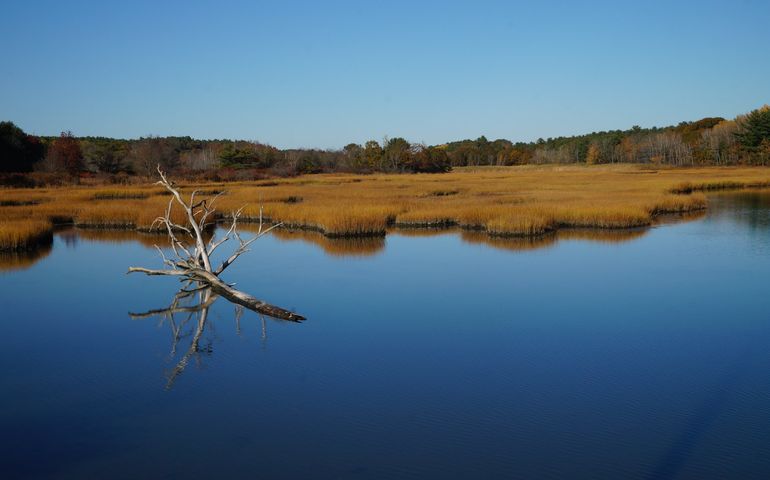Eight Maine communities picked for climate resilience pilot project
 Photo / Maureen Milliken
Eight Maine communities have been picked for a pilot project to form climate resilience plans, including West Bath, seen here at the New Meadows River crossing of Bath Road.
Photo / Maureen Milliken
Eight Maine communities have been picked for a pilot project to form climate resilience plans, including West Bath, seen here at the New Meadows River crossing of Bath Road.
Eight Maine communities will develop climate resilience plans as part of a pilot project supported by the Maine Climate Council.
The pilot project, which targets communities in three corners of the state, aims to make climate planning more consistent for all of the state's cities and towns.
The pilot localities were picked through a competitive process by the Governor’s Office of Policy Innovation and the Future and the Department of Agriculture, Conservation and Forestry. The program is funded by a $125,000 grant from the council, and the projects are in partnership with community organizations. Taking part are:
- Windham and Bridgton, in western Cumberland county, with the Greater Portland Council of Governments;
- Harpswell, Phippsburg and West Bath, on the Midcoast, with the New England Environmental Finance Center and Casco Bay Estuary Partnership at the University of Southern Maine;
- Caribou, Washburn and Fort Fairfield, in Aroostook County, with the Northern Maine Development Commission and the Nature Conservancy.
The project involves developing planning models for mitigating and adapting to climate change, and the models can then be copied in towns and cities across the state. Many communities are assisted by state and private organizations, but technical and financial support is not uniform and progress has been uneven, state officials said. By creating a resilience planning model, the projects will help advance other local efforts.
Maine’s four-year climate action plan, Maine Won’t Wait, recommended enhancing state support for communities to build resilience, such as by adopting official sea-level rise projections, incorporating climate change in land-use planning and strengthening public-health monitoring, education and prevention.
“With increasing storm events, droughts, and rising sea levels, Maine’s climate action plan calls for empowering communities to help them become more resilient to the impacts of climate change,” said Hannah Pingree, director of the Governor’s Office of Policy Innovation and the Future and co-chair of the council.
“The partnerships behind this pilot project will help inform the state as it seeks to increase both funding and technical assistance to support crucial resilience planning for Maine’s cities and towns.”
Jay Kamm, senior planner at Northern Maine Development Commission said the project will help increase understanding of issues in the Aroostook River watershed in northern Maine. “We hope this can serve as a catalyst for assisting more communities in Aroostook and Washington counties from the planning stage to obtaining financing to address potential climate change issues in the future," Kamm said.
At the opposite corner of the state, communities are happy to be part of the process.
“Maine’s inland communities are being impacted now by climate change, but have not been the focus of climate planning in recent years," said those involved in the Cumberland County effort.
"Given the immediate impacts of sea level rise on coastal communities. Inland communities need support to plan for climate change impacts they are already seeing, like increased tick activity, flooding of inland waterways and degraded water quality,” said Linda LaCroix, Bridgton community development director; Gretchen Anderson, Windham sustainability coordinator; and Sara Mills-Knapp, sustainability program director at GPCOG.
Coastal communities have unique issues, too. “The neighboring coastal communities of our pilot project share distinct social and geographic vulnerabilities and have a history of collaboration,” said Martha Sheils, director, New England Environmental Finance Center, and Victoria Boundy, community engagement coordinator, Casco Bay Estuary Partnership. “New England EFC and CBEP are excited to support these towns to make regionally informed, science-based policy and planning decisions and to set them up for sustainable financing.”
Maine Won't Wait climate plan underway
The community resilience grants are the latest step in the Maine Won’t Wait implementation, the state’s four-year plan for climate action that was launched on Dec. 1. Since the plan was introduced, the state has acted on multiple objectives, including:
- Convening an Equity Subcommittee to ensure shared benefits from climate action and policy across diverse populations in Maine.
- Launching a Forest Carbon Task Force to develop incentives for private forest and woodlot owners to use their lands to sequester carbon emissions.
- Introducing legislation to phase down the use of hydrofluorocarbons in Maine, a climate “super pollutant” used in refrigeration.
- Supporting legislation to increase efficiency through appliance standards, start clean energy finance programs for businesses, and advance the clean energy economy through new energy projects and workforce development.
- Developing efforts to help communities manage sea level rise impacts and supporting the state adoption of an official sea level rise projection.
- Releasing the first lead-by-example targets for state agencies.
- Launched a clean transportation roadmap planning process to help achieve Maine’s goals of having 219,000 electric vehicles on the road by 2030.
- Launched the Clean Energy Innovation Challenge with the Maine Technology Institute to grow companies and entrepreneurs in Maine with new clean energy technologies or services.
In 2019, Gov. Janet Mills and the Maine Legislature enacted greenhouse gas emissions reductions and renewable energy generation targets, to protect Maine from the effects of climate change and grow a clean energy economy.
Since then, Mills has committed the state to achieving carbon neutrality by 2045 and more than doubling the state’s clean energy workforce to 30,000 by 2030 through increased support of workforce development and training, as well as emerging energy technology.
Mills recently advanced several climate initiatives through the Maine Jobs & Recovery Plan, bond package and supplemental budget proposals, including funds to further assist municipalities in protecting roads, bridges and other critical infrastructure from climate effects.










0 Comments